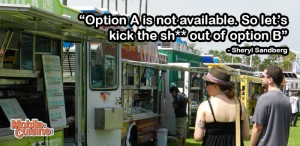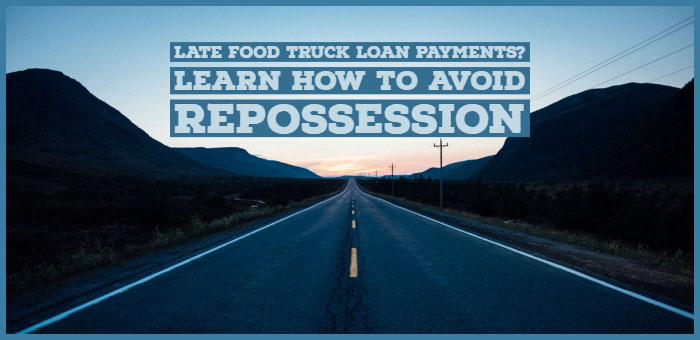For most mobile food vendors, their largest operating expense is their food truck. While some vendors are lucky enough to have had cash set aside to open their business, the vast majority look at financing as the primary option of getting their business on the road. Because so many vendors have food truck loan payments, you also add risk for running your business since there’s less financial wiggle room to operate.
If you find yourself saddled with a monthly food truck payment that you can’t afford, don’t panic. You have some options.
Page Contents
Know Your Budget
First things first. Before you get in trouble by getting behind on a loan, you need to understand your budget and how much you can truly afford when it comes to financing a food truck. The best way to do this is to create a business plan for your business. The financial section of your business plan will layout every single cent required to get started and to maintain your profit. This begins at knowing how much your menu will cost to purchase, store and prepare.
The financials will also have you look at your labor costs. When combining labor and food costs, you will end up with your prime cost. This will be a big chunk of your monthly expenses, but doesn’t even start with the cost of your food truck and kitchen equipment. Your menu and labor requirements will show you the type of equipment and the size of a truck you will need.
At this point you can start talking with builders. Get at least 3 quotes from reputable food truck manufacturers to get an idea what they will charge to get your truck on the road. Once you have all of your numbers in place, take a serious look at them and determine what it will take for you to not only purchase your food daily, pay your employees, pay rent at a commissary, but also make a profit. You can find more information about the cost of starting a food truck here.
If you are looking at having to sell 200 menu entrees a day just to break even, either you need to find a less expensive food truck, or you need to retool your business plan so you aren’t struggling every month.

Setting a budget helps reduce the risk of financial challenges.
Review Your Loan
Before you purchase a food truck or trailer, shop around for the best financing deals. It may seem easier to make a purchase from a local area food truck builder, but with a lack of competition in most regions, you could get stuck with bad terms. Consider the interest rate and the length of the loan, not just the amount of the monthly payment.
If you already have a food truck loan in place, pull out the paperwork and dig in. Find out all of the important data, especially the interest rate, length of loan, and penalties for late loan payments.
Lenders understand that businesses can go through tough times, whether due to economic downturns, unexpected expenses, or other challenges. Many have policies in place for such situations, offering temporary relief options like payment deferrals or modified payment plans.
Know Your Options
How you proceed depends on whether your missed loan payment is a one time issue or a sign that you can’t afford your food truck loan.
- One Time Issue. Loan deferment is a common solution for a single missed payment. The missed payment is pushed to the end of the loan term, and you’ll generally only have to pay the interest owed this month. Some lenders may waive late payment fees as well. In general, lenders are more forgiving when you’ve taken the initiative to communicate with them.
- Financial Hardship: If you’re experiencing temporary financial hardship due to unforeseen circumstances (like a global pandemic, natural disasters, or a sudden drop in business), lenders might be more inclined to offer leniency by understanding that these are not normal conditions.
- Can’t Afford Loan. If your food truck loan has become unaffordable, you’ll need to deal with this by first seeking a deferment. This will stop the immediate threat to your credit score. Then it’s time to look into long term solutions, such as refinancing or selling your business outright.
In some cases, selling a food truck to get out of a high-interest loan may be the only option. There are a variety of options for selling your food truck online if you find yourself in this position.

Know your options.
Communicate With the Lender
Communication with your lender is vital and can be the difference between keeping your food truck and having it repossessed. If you aren’t able to make your food truck loan payment, call your lender immediately. Their teams are prepared to work with you to understand your situation and try to find options that help.
The bank will want to know about what is preventing you from making your loan payments. If you’ve had death in the family, a serious illness or if the truck has broken down and you can’t get back on the road, tell your lender.
Some lenders will allow a time during which you can miss or make reduced payments until your situation is better. Some banks may even be willing to rearrange the loan terms to a payment that’s easier to manage. Keep in mind that lenders don’t want your food truck and will usually only repossess it when they have no other options. It’s costly and time-consuming for lenders to deal with defaults and repossessions. They would rather work out a plan that keeps you making payments, even if those payments are reduced or delayed.
In some cases, lenders are under regulatory guidelines to offer assistance programs to borrowers facing financial hardship, especially if it can prevent loan default.
When contacting your lender, be prepared to explain your situation clearly, provide documentation if required, and demonstrate your commitment to repaying the loan under adjusted terms. Options they might offer include:
- Deferred Payments: Temporarily pausing payments, with the understanding that they will need to be made up later.
- Extended Loan Term: Spreading out payments over a longer period to reduce the monthly amount.
- Interest-Only Payments: Temporarily making payments that only cover the interest, reducing the monthly payment amount.
- Loan Modification: Changing the terms of your loan to make it more manageable based on your current financial situation.
Remember, communication is key. The sooner you reach out to your lender with your concerns and willingness to find a solution, the more likely you are to receive a favorable response.
A Note About Turning In Your Truck
If a tow truck takes your food truck, that’s considered a repossession. If you arrange to drop off the vehicle with the lender that’s viewed as a voluntary surrender.
If you voluntarily surrender your food truck, you’ll avoid repayment of the costs the bank incurs for the tow truck and storage. But lenders see repossession and voluntary surrender as essentially the same thing. Although each show up differently on your credit report, neither will ultimately be good for your credit.
The Bottom Line
To learn more about your rights and specific repossession requirements in your state, contact your State Attorney General or local consumer protection agency.
If you don’t plan ahead or have a nest egg sitting in the bank, you could run into trouble. Maybe you’ve had a major life changing moment. Perhaps your sales have dried up. Whatever the reason, you’re afraid of falling behind on your food truck loan payments and maybe even defaulting altogether. This can even happen to veteran food truck vendors. If it happens to you, know that there are options to help save the business you’ve sacrificed so hard to create.




